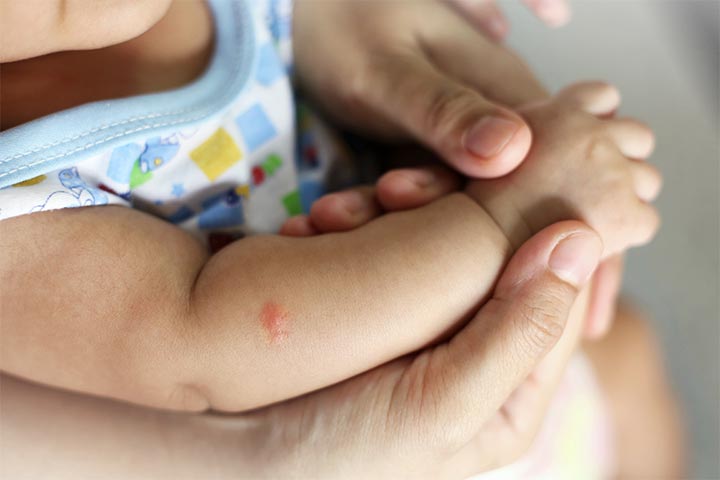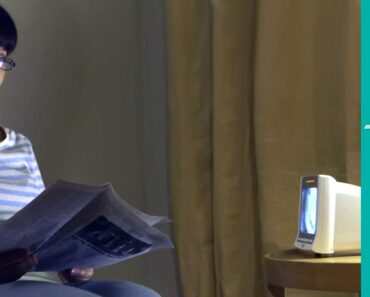Shutterstock
Malaria is a parasitic disease that spreads in humans through the bite of a mosquito. It is most prevalent in tropical and subtropical regions. The initial symptoms include headache, fever, and shaking chills. Anyone can get malaria, but children between the ages of six months and five years are most susceptible to severe symptoms and complications.
Read this post to learn about the causes, symptoms, treatment, and prevention of malaria in babies.
How Common Is Malaria In Babies?
According to the World Health Organization, children younger than five years accounted for 67% of fatalities due to malaria in 2019 (1) (2). Inadequate immunity is usually the common reason why babies and toddlers could be more susceptible to a severe form of the disease.
Babies usually also do not adequate skills to avoid mosquitoes, which are the vector of malaria. Several babies in malaria-endemic regions may also experience maternal malaria since malarial parasites can reach the fetus (3). It may lead to poor health and low immunity at birth, further increasing the risk of malaria.
What Causes Malaria In Babies?
Malaria is caused and transmitted through the following ways (4) (5).
1. Bite of Anopheles mosquito
Malaria is caused by a parasite called plasmodium, which is transmitted through the bite of an infected female Anopheles mosquito. The mosquito gets the parasite when it feeds on the blood of a person with malaria. The parasite stays in the Anopheles mosquito’s saliva, making the insect a vector for the disease.
When the mosquito bites an uninfected person, the parasite transmits from the insect’s saliva into the person’s bloodstream. Once inside the body, the parasites reach the liver, where they mature and multiply. The mature parasites move back into the bloodstream, infecting the red blood cells.
The mature malarial parasites multiply in infected red blood cells, causing the cell to rupture and infecting other red blood cells. This breakdown of red blood cells happens every 48-72 hours, triggering the symptoms.
There are five types of plasmodium that cause malaria in humans.
- Plasmodium falciparum: It is the most common type of plasmodium and responsible for most malaria-related deaths. The parasite is predominantly found in Africa.
- Plasmodium vivax: It is mostly found in Asia and South America. The parasite causes less severe symptoms but could stay dormant in the liver for three years, causing relapses in a few cases.
- Plasmodium ovale: It is primarily found in West Africa and is uncommon.
- Plasmodium malariae: It is a less common type of parasite and is only found in parts of Africa.
- Plasmodium knowlesi: It is a rare form of the parasite and only found in Southeast Asia.
2. Congenital malaria
Since malarial parasites infect red blood cells, they can reach the fetus through the placenta. A baby could be born with malaria at birth (congenital malaria) if the mother developed malaria anytime during the pregnancy. It may cause low birth weight and a high risk of mortality, especially during the first month.
Congenital malaria tends to be common in settings where there is poor prenatal care and in regions where malaria cases are widespread.
3. Infected donor blood
A baby may receive plasmodium from the blood of a donor infected with malaria. It may also transmit through the use of infected needles. Such cases are rare and usually occur in healthcare settings that lack even basic safety protocols.
Can A Baby Get Malaria Through Breast Milk?
A baby cannot get malaria by breastfeeding since the plasmodium parasite does not transmit through breast milk (6). However, malaria medications may pass into breast milk. If you have malaria and intend to breastfeed, speak to your doctor before initiating treatment.
Symptoms Of Malaria In Babies
Babies with malaria could show the following symptoms (7) (8).
- Fever: Babies could develop high fever accompanied by strong chills and sweating. The fever may cause febrile convulsions in some babies.
- Cough: Cough is often an early symptom of malaria.
- Gastric symptoms: It includes nausea, stomach pain, vomiting, and acute diarrhea.
- Pain: Muscle pain and headaches are usually most common. Toddlers may also complain of pain in specific body parts, such as the back.
- Fatigue: Babies with malaria could feel tired, weak, and drowsy. They might also become cranky, develop a poor appetite, and have problems falling asleep.
- Jaundice: Malaria leads to a constant breakdown of red blood cells, causing excess accumulation of bilirubin, which is a byproduct of the red blood cell breakdown. This could cause bilirubin accumulation in the body, leading to jaundice in some babies.
Malaria caused by plasmodium falciparum may become severe if left untreated for 24 hours. It may lead to severe symptoms and related complications, such as cerebral malaria, respiratory problems, metabolic acidosis (increased acidity in blood and tissue fluids), and severe anemia (1).
Many of these symptoms may occur due to other illnesses. Therefore, consult a pediatrician soon if the baby displays these signs and symptoms.
How Is Malaria Diagnosed?
The doctor will check the symptoms. Parents may be asked about any travel history to malaria-endemic regions. If malaria is suspected, the doctor may order the following tests to make a diagnosis (9).
- Blood tests: Plasmodium parasites are visible under the microscope. A smear of the patient’s blood is taken, stained, and observed under the microscope.
- Rapid diagnostic tests (RDT): Rapid diagnostic tests can be used if microscopic tests are unavailable. These tests detect the malarial antigens using the dipstick or cassette format. It takes only 2-15 minutes to get the result.
How Is Malaria In Babies Treated?
The World Health Organization suggests the use of artemisinin to treat uncomplicated malaria in infants (10). The drug is used in combination with other medicines, and the treatment is called artemisinin-based combination therapy. A combination treatment could help prevent plasmodium resistance.
The dosage of artemisinin and other medicines will depend on several factors, such as the baby’s weight and severity of symptoms. The mode of administration could be intravenous or oral.
Severe cases of malaria could require treatment with rectal artesunate. Complicated cases of malaria could require treatment with intravenous artesunate (11). The duration of treatment could vary as per the baby’s health and severity of symptoms.
What Are The Long-Term Effects Of Malaria On Babies?
Most cases of uncomplicated malaria seldom cause any long-term problems. Research notes that malaria in young children may affect the child’s physical and cognitive development temporarily (12). These effects may mostly occur due to untreated severe and complicated malaria.
How To Prevent Malaria In Babies?
The following measures could help prevent malaria in infants.
1. Avoiding mosquito bites
An effective way to prevent malaria is to prevent mosquito bites. Below are ways to protect your baby from mosquito bites (13) (14).
- Attach a mosquito net to the windows to keep mosquitoes out.
- You may attach a mosquito net to your baby’s crib. Make sure to check for any trapped mosquitoes inside the net before placing the baby in the crib.
- You may use air conditioning or fans to keep mosquitoes out.
- Dress your baby in clothing that covers the limbs when visiting places that may have mosquitoes, such as parks.
- You may apply insect repellent cream to the exposed skin. However, many insect repellents are not recommended for babies and toddlers. Consult a doctor before using insect repellent for your baby.
2. Preventing malaria through medicines
Preventive medications could be considered when avoiding mosquitoes is difficult. A common therapy used is the intermittent preventive therapy in infants (IPTi) with sulfadoxine-pyrimethamine (SP). The therapy is called SP-IPTi (15.
The therapy involves the administration of sulfadoxine-pyrimethamine at the ages of ten weeks, 14 weeks, and nine months. Other medicines, such as amodiaquine, may also be used. The preventive therapy causes sustained quantities of malarial drugs in the blood, preventing symptoms even if the baby contracts the parasite (16).
Preventive therapy may have contraindications and may only be necessary if you live in a malaria-endemic region with no facilities to control mosquito populations.
Malaria was once a chronic disease in many regions of the world. Thanks to advancements in methods to control mosquito populations, the disease has become less common in several regions. It is still best to observe caution and avoid mosquito bites. If you intend to visit a malaria-endemic region, make sure to protect the baby from mosquito bites and choose hotels or lodges with facilities to avoid contact with mosquitoes.


































